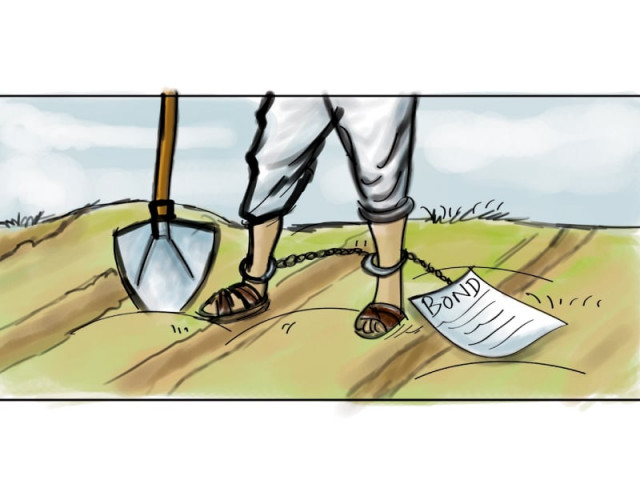‘To end bonded labour, agriculture workers need to be registered’
SPARC calls civil society members, law dept officials to discuss amendments to bonded labour act

Some of the amendments that came to fore included punishment of up to five years, and making bonded labour a non-bailable and compoundable offence. ILLUSTRATION: MUNIRA ABBAS
Members of the civil society, law department officials and parliamentarians were brought together by the Society for the Protection of the Rights of the Child (Sparc) to amend the Bonded Labour System (Abolition) Act, 1992.
"It is ironic that those in the agriculture sector have not been registered," pointed out Pakistan Tehreek-e-Insaf's (PTI) MPA Seema Zia. "No census has been conducted in the country for so many years."
Some of the amendments that came to fore included punishment of up to five years, and making bonded labour a non-bailable and compoundable offence. Speakers pointed out that the menace can only be eliminated completely if caste systems in communities are also abolished.
Sparc national manager Kashif Bajeer explained that the bonded labour abolition law came into being at the federal level in 1992 but it has yet to be adopted by the Sindh government after the subject was made provincial. On the issues of bonded labourers themselves, he said that once they are rescued and released, no FIRs and cases are registered against the landlords and feudal lords who held them. "Once the labourers are freed, there is no plan for their rehabilitation."
Activist Iqbal Detho suggested handing over the implementation of the amended bonded labour law to the home department once it is passed in the assembly. The federal government should release the funds allocated for bonded labourers, he added.
The executive director of Pakistan Institute of Labour Education and Research, Karamat Ali, said that old-age benefits and social security should also be extended to agricultural workers.
In the end, provincial law minister Sikandar Mandhro asked for the amendments to be discussed with landlords and bonded labourers. He wanted the two sides to be properly represented when the amendments are made to the law and only those changes should be put forward that the two sides agree on.
Referring to the demand to set a minimum wage, Mandhro asked the participants to consider if it is feasible for the government to pay minimum wage to 60 per cent of the population involved in the agriculture sector.
Once the amendment draft is finalised, Mandhro assured that he will send it to labour department and will follow it through. The participants agreed to table the amendment draft in the Sindh Assembly session in August.
Published in The Express Tribune, May 31st, 2015.



















COMMENTS
Comments are moderated and generally will be posted if they are on-topic and not abusive.
For more information, please see our Comments FAQ